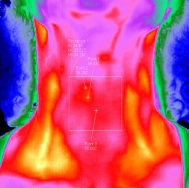THYROID SCREENING
|
Thermography offers a non-invasive, non-radiologic measurement of thyroid physiology. As such it will not detect nodules or tumors, but will provide a representation of physiologic dysfunction which, when coupled with history, physical examination and aforementioned tests will provide a far greater picture of the thyroid function.
|
Thermology is the measurement of temperature variations at the body surface. As with the oral thermometer that has been used for many years, changes in temperature indicate disease processes. Finely tuned technology can find abnormalities in human wellness long before the body's sensory organs can identify them. This is also true for thyroid dysfunction.
Thermology offers a non-invasive, non-radiologic measurement of thyroid physiology. As such it will not detect nodules or tumors, but will provide a representation of physiologic dysfunction which, when coupled with history, physical examination and aforementioned tests, will provide a far greater picture of the thyroid function.
When performing thyroid thermology we look for significant temperature asymmetry between the lobes or a temperature variation between the thyroid gland and its surrounding structures. Thyroid Screening with thermology searches for heat that is seen with both hyperthyroid (a condition in which your thyroid gland produces too much of the hormone thyroxine and is considered to be overactive) and hypothyroid (a condition in which your thyroid gland doesn't produce enough of certain important hormones and is considered to be underactive). Hashimoto's disease is a condition in which your immune system attacks your thyroid. The resulting inflammation from Hashimoto's disease, also known as chronic lymphocytic thyroiditis, often leads to hypothyroidism.
People with normal studies who are still experiencing symptoms will now have definitive medical evidence which will allow for a more comprehensive treatment program.
Thermology offers a non-invasive, non-radiologic measurement of thyroid physiology. As such it will not detect nodules or tumors, but will provide a representation of physiologic dysfunction which, when coupled with history, physical examination and aforementioned tests, will provide a far greater picture of the thyroid function.
When performing thyroid thermology we look for significant temperature asymmetry between the lobes or a temperature variation between the thyroid gland and its surrounding structures. Thyroid Screening with thermology searches for heat that is seen with both hyperthyroid (a condition in which your thyroid gland produces too much of the hormone thyroxine and is considered to be overactive) and hypothyroid (a condition in which your thyroid gland doesn't produce enough of certain important hormones and is considered to be underactive). Hashimoto's disease is a condition in which your immune system attacks your thyroid. The resulting inflammation from Hashimoto's disease, also known as chronic lymphocytic thyroiditis, often leads to hypothyroidism.
People with normal studies who are still experiencing symptoms will now have definitive medical evidence which will allow for a more comprehensive treatment program.
